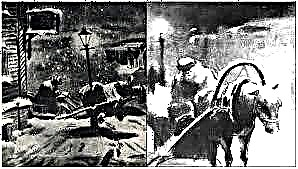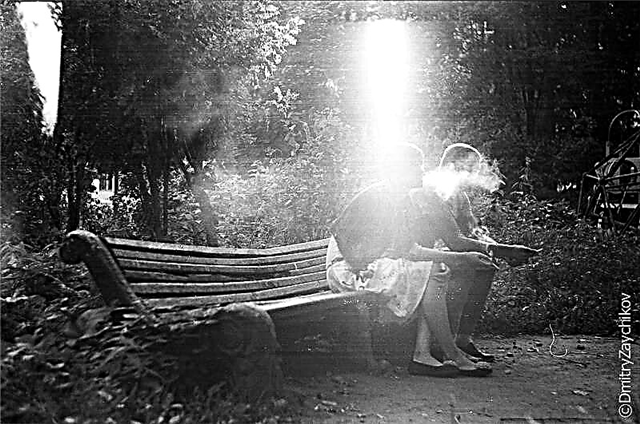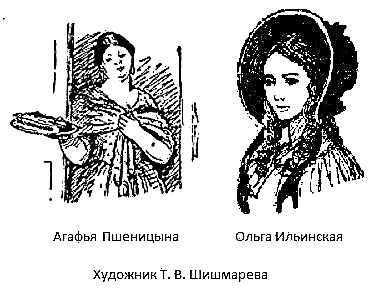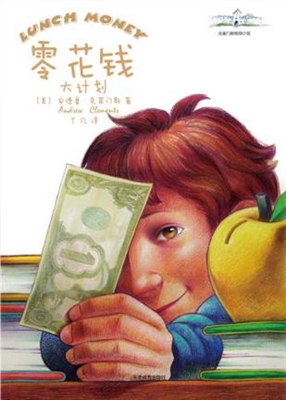Petersburg Mikhailo Ivanovich Moshkin, a 50-year-old official, a college assessor, invited friends for dinner. In addition to Mikhailo Ivanovich himself and his 19-year-old orphan, Masha, there are Masha’s fiancé, 23-year-old college secretary Pyotr Ilyich Vilitsky, (“indecisive, weak, proud man”), Aunt Masha (talkative gossip “), and a provincial poor man the landowner Shpundik, (with some "claims to education"), with whom Moshkin was familiar 20 years ago. Masha’s fiance brought a friend, Rodion Karlovich Fonk, titular adviser, for 29 years. This creature is "cold", limited, for which the main thing is money, career, secular conventions.
Moshkin’s modest apartment, an inept cook, and Moshkin himself, gullible, not rich, sincere - all this makes Fonk a miserable impression. And the bride! The lack of secular education, shyness, gullible simplicity ... And above all - the lack of money, important connections. No dowry. Then, in the second act, he reveals his views to Vilitsky: "Your bride is a very kind, very nice girl ... But you know, the best diamond needs some decoration."
Then the groom in his “internal monologue” also spoke out: “She is shy, wild ... she never lived in the world ... Of course. From whom did she borrow ... this ... well, these manners, finally ... not from Mikhail Ivanovich, indeed ... Moreover, she is so kind, she loves me so ... Yes, and I love her . (With ardor). Do I say that I do not like her? .. Only now ... I agree with Fonk: education is an important thing, a very important thing. "
And about his career, Fonk, in private with Vilitsky, spoke frankly. “Of course, you can marry to continue the service - there is no dispute; here’s what, Pyotr Ilyich: everything can be reached with time; but who does not prefer the shortest path? Hard work, diligence, accuracy - all this does not remain without a reward, for sure; brilliant abilities are also very useful in an official: they draw the attention of his superiors to him; but connections, Pyotr Ilyich, contacts, good acquaintances are an extremely important thing in the world. I already told you my rule about avoiding close relations with people of the lower circle; something else naturally follows from this rule, namely: try to get to know the higher people as much as possible. And this is not even too difficult. In society, Pyotr Ilyich is always ready to accept an active, modest, educated official; and once adopted in a good society, he may eventually conclude a profitable party ”...
In the first act, barely appearing in Moshkin’s house, Fonk seized the moment and asked the groom: "Your bride ... she ... doesn’t have much fortune?" “She has nothing,” the fiancé confessingly confesses.
Gradually doubts embrace the soul of the lover. He is tormented at first, cannot decide on anything. “But listen, Rodion Karlych, .. How do you want me to give up my word now? ... now I have to go all the way.” How do you want me to drop this responsibility? You’ll be the first to despise me ... ”
And now the gap has almost come. The groom does not appear for a long time. Moshkin, sincerely attached to the orphan Masha, the daughter of a deceased neighbor, the impoverished widow of a petty official, believes Shpundik his doubts.
“Well, suppose, after that dinner, you remember that he didn’t like something ... I went to him, explained to him; well, brought him here; Masha cried, forgave him ... well. Well, it’s all right, right? .. The next day he arrives, and the guesthouse still brought; turned around for a minute - look ... and left. Says: business. The next day was not at all ... Then he arrived again, sat for only an hour and was silent almost all the time. You know, about the wedding, they say, that is, how and when ... it's time to say; yes, yes - and only; yes, since then it’s gone again. You can never find him at home, he does not answer notes.
Finally, a letter arrives from Vilitsky. “After a long and long struggle with himself,” he came up with a difficult decision: “I do not admit that I am able to make Mary Vasilyevna’s happiness and beg her to accept the promise from me back.”
Moshkin wants to immediately run to the treacherous groom.
"How? You have been coming to our house for two years, you are being received as a native, they are sharing the last penny with you ... the wedding has already been scheduled, and you ... oh - oh - oh! .. It can't end this way ... No, not...".
He was especially indignant at the end of the letter: "I will pay all my debts in full." "Yes, I don’t want a penny from him!". But Moshkin’s explanation with the groom did not take place: the groom moved out of the apartment and “didn’t tell him to tell where.”
And then Masha also says that she should “move out” from Moshkin: “Everyone will say: he refused, well, what is it? She is, after all, a foster child; he eats bread for nothing ... But doesn’t she feel like working? ” Moshkin in horror: “But where will you go?” “Somewhere. First I’ll move to my aunt, and then I’ll see: maybe I’ll find a place somewhere. ” But the aunt, says Moshkin, herself lives in a strange closet behind the partition, along with various trash. “Masha (somewhat offended). I am not afraid of poverty. ”
But Moshkin is so alone! “You judge: after all, I only live for you ... After all, your absence will kill me ... Masha, take pity on the poor old man ... What have I done to you?”
Moshkin wants to protect her: “either I will arrange everything as before, or I will challenge him to a duel ...”
Masha (in a choking voice). Listen, Mikhailo Ivanovich! I tell you: if you don’t give up your intention now, by golly, in your eyes ... well, I don’t know ... I will take my life.
In the end, in order to save the orphan from wandering, searching for a piece of bread, from humiliation, Moshkin, a selfless man, is ready to fictitiously marry Masha: to legitimize her position.
But she believes him so much, loves him so much that she decides to marry him not fictitiously, but for real. Everyone is happy.
So, the calculated greed of St. Petersburg officials, and against its background - islands of kindness, sincerity. Everything in this case ends happily, as usual in Turgenev’s plays; but the possibility of tragedy is always nearby somewhere: this is the social structure of life.












